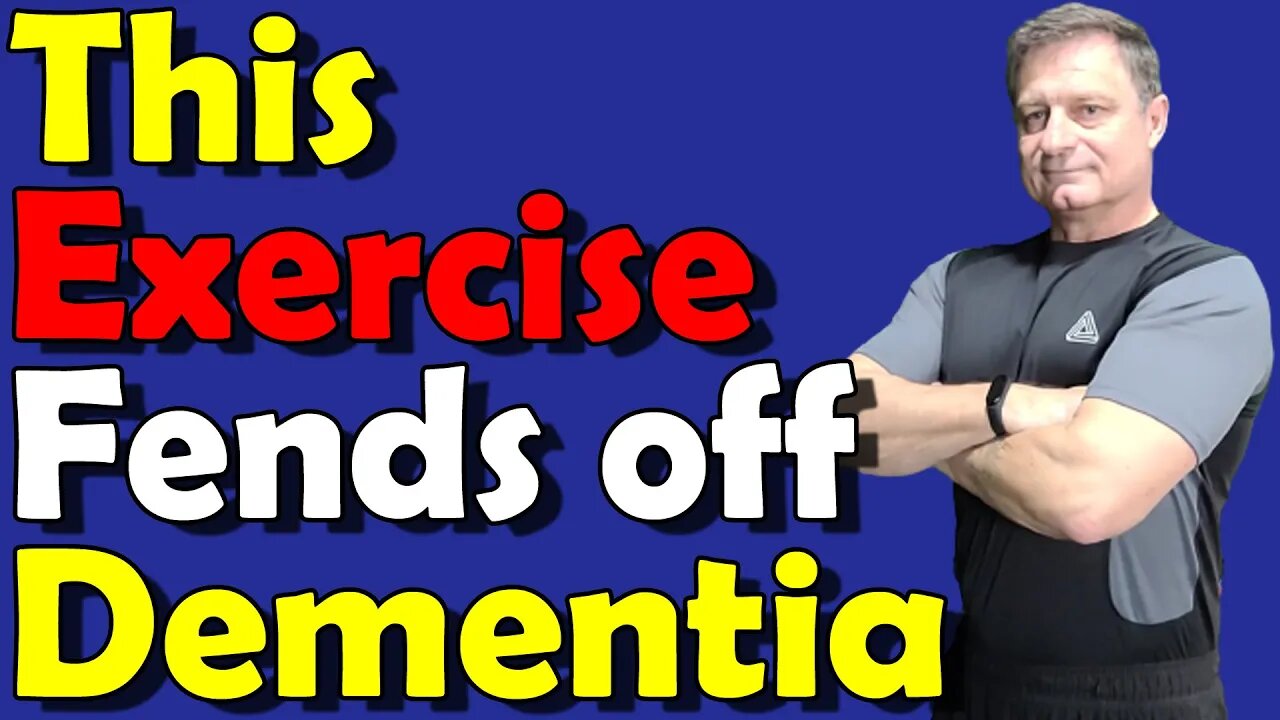Premium Only Content

Latest Research: Only 6 Minutes of This EXERCISE to Boost LONGEVITY
A study out of New Zealand seems to show that 6 minutes of a particular type of exercise boosts a protein in the brain that works to fend of the diseases of aging.
DoNotAge.org 10% Discount Code: MYNMN (https://bit.ly/2VBDgNt)
Renue by Science 10% Discount Code: MYNMN (https://renuebyscience.com/?rfsn=5692699.331801&coupon-code=MYNMN)
Renue by Science 15% Subscription Service Discount Code: MYNMNSUB
I hope you enjoy my content and find it interesting or informative, if so, please consider supporting the channel by using one of the links below:
* Buy me a Kofi: https://ko-fi.com/mynmnexperiment
* Patreon: https://bit.ly/3hhfjl5
* SubscribeStar: https://bit.ly/3psYo23
My Current Anti-Aging Protocol:
• 1.5 grams of NMN (https://bit.ly/3c2Fxt8)
• 1.5 grams of Trans-resveratrol (Tue, Thu & Sat) (https://bit.ly/3yxeqy2)
• 500mg Metformin
• 1.5 grams of TMG (https://bit.ly/3oe1Ted)
• 5,000 IU (International Units) of vitamin D3 (https://bit.ly/3P32hYH)
• 120 mcg (micrograms) of vitamin K2 (Mk 7) (https://bit.ly/3PhkBgn)
• 250mg Magnesium (L-Threonate) (https://bit.ly/3O4pZ5o)
• 200mg high molecular weight hyaluronic acid (https://bit.ly/3P0Z4c2)
• 2,400mg of Fisetin, on the 1st, 2nd & 3rd of each month (https://bit.ly/3P2rSB0)
• 2,400mg of Quercetin, on the 1st, 2nd & 3rd of each month (https://bit.ly/3IzulAy)
• 81mg of aspirin (https://bit.ly/3uFjtem)
• 800mg SIRT6 Activator
• 600mg DIM
Links:
https://pubmed.ncbi.nlm.nih.gov/36631068/#:~:text=Fasting%20for%2020%20h%20caused,in%20peripheral%20circulation%20at%20rest.
https://physoc.onlinelibrary.wiley.com/doi/10.1113/JP283582
https://www.medicalnewstoday.com/articles/6-minutes-of-hiit-may-help-delay-onset-of-alzheimers-parkinsons
https://www.upi.com/Health_News/2023/01/12/new-zealand-study-high-intensity-exercise-brain-health/4641673500756/
https://www.sciencedaily.com/releases/2023/01/230112090919.htm
Six minutes of high-intensity exercise could extend the lifespan of a healthy brain and delay the onset of neurodegenerative disorders, such as Alzheimer's disease and Parkinson's disease. This new research published in The Journal of Physiology showed that a short but intense bout of cycling increases the production of a specialized protein that is essential for brain formation, learning and memory, and could protect the brain from age-related cognitive decline. This insight on exercise is part of the drive to develop accessible, equitable and affordable non-pharmacological approaches that anyone can adopt to promote healthy aging. The specialized protein named brain-derived neurotrophic factor (BDNF) promotes neuroplasticity and the survival of neurons. Neuroplasticity is the mechanism by which the brain forms new connections and pathways. Animal studies have shown that increasing the availability of BDNF encourages the formation and storage of memories, enhances learning and overall boosts cognitive performance. These key roles and its apparent neuro-protective qualities have led to more interest into BDNF for aging research.
Travis Gibbons, a PhD candidate at the University of Otago and Lead Author of the study said "BDNF has shown great promise in animal models, but pharmaceutical interventions have thus far failed to safely harness the protective power of BDNF in humans. We saw the need to explore non-pharmacological approaches that can preserve the brain's capacity which humans can use to naturally increase BDNF to help with healthy aging."
To tease apart the influence of fasting and exercise on BDNF production, the researchers, from the University of Otago, New Zealand, compared the following factors to study the isolated and interactive effects:
• First was fasting for 20 hours
• Second, light exercise (90-minutes of low intensity cycling)
• Third, was high-intensity exercise (six-minute bouts of vigorous cycling)
• And fourth was a combination of fasting and exercise
They found that brief but vigorous exercise was the most efficient way to increase BDNF compared to one day of fasting, and that was with or without a lengthy session of light exercise.
High intensity exercise increased BDNF by four to five-fold (396 pg L-1 to 1170 pg L-1); an increase of 774 points
Fasting showed no change in BDNF concentration
Low intensity, prolonged activity showed a slight increase in BDNF concentration, (336 pg L-1 to 390 pg L-1); and increase of only 54 points.
DISCLAIMER: This video and description contain discount codes, which means that if you use the code, I will receive a small commission.
FAIR-USE COPYRIGHT DISCLAIMER
Copyright Disclaimer Under Section 107 of the Copyright Act 1976, allowance is made for "fair use" for purposes such as criticism, commenting, news reporting, teaching, scholarship, and research. Fair use is a use permitted by copyright statute that might otherwise be infringing. Non-profit, educational, or personal use tips the balance in favor of fair use. #HIIT #Dementia #fitnessmotivation
-
 9:59
9:59
My Longevity Experiment
4 months ago $0.15 earnedWhy Skipping these 5 Supplements Leads to Serious Health Problems in your 50’s & 60”s
149 -
 27:28
27:28
Glenn Greenwald
2 hours agoGlenn Reacts to Trump's Gaza Take Over: System Update Special
18.4K35 -
 DVR
DVR
Redacted News
1 hour agoBREAKING! EPSTEIN LIST INCOMING UNDER AG PAM BONDI? DEMOCRATS FREAKING OUT, PRINCE ANDREW NERVOUS
18.6K91 -
 52:02
52:02
Candace Show Podcast
4 hours agoBecoming Brigitte: An Inaccessible Past | Ep 2
24.2K66 -
 1:54:12
1:54:12
Right Side Broadcasting Network
6 hours agoLIVE: President Trump Signs EOs; Pete Hegseth Meets with Netanyahu - 2/5/25
87.1K40 -
 1:51:41
1:51:41
Dr. Drew
4 hours agoPsychics Investigate DC Black Hawk & Philadelphia Medical Plane Crashes w/ Zach Vorhies + Eddie Conner & Andrew Anderson – Calling Out w/ Susan Pinsky – Ep 166
45K6 -
 1:03:04
1:03:04
In The Litter Box w/ Jewels & Catturd
21 hours agoDemocrats Come Unglued | In the Litter Box w/ Jewels and Catturd Ep. 735 - 2/5/2025
50.3K31 -
 1:44:25
1:44:25
The Quartering
5 hours agoTrump Impeachment, Democrat Insurrection, Massive Scandal At Politico & DC Crash Update!
82.1K41 -
 LIVE
LIVE
Dr Disrespect
6 hours ago🔴LIVE - DR DISRESPECT - KINGDOM COME: DELIVERANCE 2 - FIRST IMPRESSION
2,986 watching -
 37:54
37:54
CryptoWendyO
4 hours ago $0.70 earnedBEST DAY IN CRYPTO HISTORY
5.36K2